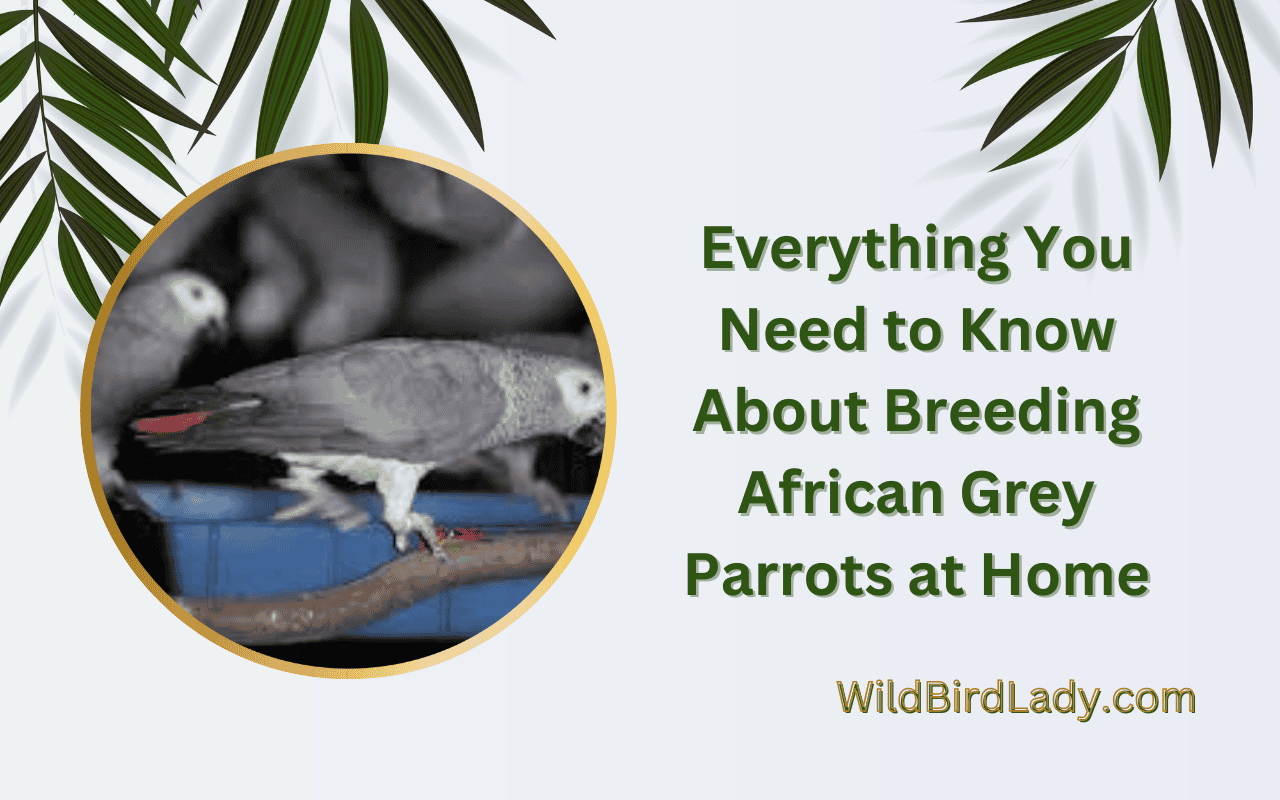Breeding african grey parrots at home requires extensive knowledge and experience. In order to prevent health issues and ensure successful reproduction, it’s essential to provide proper nutrition, a comfortable living space, and appropriate breeding conditions.
African grey parrots are intelligent and affectionate birds known for their exceptional talking ability and charming personalities. With their striking gray plumage and bright red tails, they make excellent pets and are often sought after by bird enthusiasts. However, breeding these parrots can be a challenging task that requires expertise and a lot of care.
This article will cover everything you need to know about breeding african grey parrots at home, including how to select breeding pairs, prepare for their arrival, provide proper nutrition, set up their living space, and create optimal breeding conditions. With this information, you’ll be equipped to start your own successful breeding program.

Credit: www.amazon.com
Preparing For Breeding
Breeding african grey parrots at home can be an exciting and rewarding experience for bird enthusiasts. However, it’s not something to be taken lightly, as it requires a significant investment of time, effort, and financial resources. In this comprehensive guide, we’ll provide you with everything you need to know about breeding african grey parrots at home, from selecting the right pair of birds to understanding the breeding process.
Let’s begin by looking at the first step in the process, preparing for breeding.
Selecting The Right Pair Of African Grey Parrots
Breeding african grey parrots requires that you have a male and a female bird. When selecting a pair, consider the following factors:
- Age: Both birds should be mature, with a minimum age of three years. Breeding too early can lead to health complications and may decrease fertility rates.
- Compatibility: Birds should be selected based on their compatibility, as birds that do not get along may not breed successfully.
- Health: Ensure that both birds are healthy and free from any health issues or illnesses that can affect breeding.
- Genetics: Selecting a pair with diverse genetic backgrounds can help promote the health of the offspring.
Creating An Ideal Living Space For Breeding
Once you’ve selected the right pair of birds, it’s essential to establish a suitable living space. Consider the following factors when setting up a breeding area for african grey parrots:
- Cage: A large, well-ventilated cage with enough space for the birds to move around comfortably is essential. The cage should be placed in an area that is free from disturbances and harmful fumes.
- Nest box: Provide a suitable nest box for the birds to breed in. The box should be large enough to accommodate both birds and have an entry hole that is big enough for birds to enter and exit but not too large to allow predators to access.
- Lighting: Provide adequate lighting to mimic natural daylight. The ideal lighting situation is 12 hours of daylight and 12 hours of darkness.
- Temperature: Maintain a consistent temperature in the breeding area, between 70-90 degrees fahrenheit. Avoid exposing birds to temperature fluctuations, which can be harmful to breeding.
- Diet: Ensure that the birds are fed a balanced diet, including fresh fruits, vegetables, and high-quality pellets. The diet should be formulated to support breeding activity.
Understanding The Breeding Process
Before beginning the breeding process, it’s essential to have a basic understanding of the breeding process for african grey parrots. Here are the key points to remember:
- Courtship: The courtship process involves the male performing a courtship dance to attract the female. Once the female accepts his advances, the pair will begin to bond.
- Mating: Mating can occur multiple times per day and will continue until the female lays eggs.
- Egg-laying: The female will lay a clutch of one to four eggs. The eggs will hatch after approximately 28 days.
- Incubation: The eggs will be incubated by both the male and female birds. During this time, it’s essential to provide the birds with adequate food and water.
- Fledging: After approximately 10-12 weeks, the fledglings will leave the nest.
By following these tips, you’ll be well on your way to breeding african grey parrots successfully. Remember that it’s essential to provide your birds with a stress-free environment, adequate food and water, and proper care during the breeding process. Happy breeding!
Understanding The Breeding Process
Breeding african grey parrots at home can be a rewarding experience for bird lovers. However, before embarking on such a task, it is essential to understand the breeding process to ensure healthy and happy chicks. In this comprehensive guide, we will cover everything you need to know about breeding african grey parrots at home.
So, let’s dive into the breeding process.
The Courtship Period
The courtship period is crucial for african grey parrots to prepare for breeding. During this time, the male will begin to woo the female through various behaviors, such as bringing food or toys, singing, dancing or mimicking sounds, and preening.
When they are ready to mate, the female will let the male know by lowering her head and spreading her wings.
Mating And Fertilization
Once the courtship period is over, the male will mount the female and begin copulation. The entire process can take anywhere from 20 minutes to an hour. After mating, the female will store the male’s sperm until she is ready to lay eggs.
African grey parrots usually produce one to three eggs per clutch, which they will lay every other day.
Incubation
After the female lays her eggs, it’s time for incubation to begin. If you have a breeding pair of african grey parrots, you can choose to let the pair incubate the eggs themselves or use an incubator. The temperature should be set at 99.
5 degrees fahrenheit with a relative humidity of 40-50%. The incubation period typically takes around 28-30 days.
Hatching
As the hatching day approaches, you can hear the chicks chirping inside the eggshell. When it’s time to hatch, the chick will use its egg tooth to crack the shell, and the process can take about 24-48 hours to complete fully.
It’s best to leave the chicks with their parents for the first few weeks after hatching, as they will still depend on their parents for warmth and feeding.
Care For Newborn Chicks
The first few weeks of a chick’s life are critical. Proper care will ensure healthy and happy chicks. Here are a few tips to follow:
- Provide a warm environment between 84-90 degrees fahrenheit for the first week.
- Clean the nest box regularly to reduce the risk of infections and respiratory problems.
- Make sure the chicks receive a balanced diet of formula or soft foods.
- Monitor their weight to make sure they are growing and healthy.
- Avoid handling the chicks for the first week, as this can cause stress and illness.
Breeding african grey parrots at home can be a challenging but rewarding experience. Remember to take the time to understand the breeding process before getting started to ensure healthy and happy chicks. By following the tips provided, you can raise your own african grey parrots and watch them flourish into beautiful birds.
Providing Proper Nutrition And Care
Breeding african grey parrots at home requires a lot of preparation and care to ensure healthy offspring. Proper nutrition and care play a critical role in the breeding process. In this comprehensive guide, we will explore essential dietary and veterinary considerations for successfully breeding african grey parrots at home.
Diet And Nutrition For Breeding Parents And Chicks
The diet and nutrition of breeding parents and chicks must be well-balanced and nutrient-rich. Here are some crucial dietary considerations:
- Provide a balanced diet: Offer a variety of fruits, vegetables, legumes, and nuts to ensure a well-rounded diet.
- Feed high-quality protein sources: Include sources of protein, such as cooked chicken, boiled eggs, and fish, in their diet.
- Fatty acids: African grey parrots also require healthy fats in their diet. Feed foods that are rich in omega-3 fatty acids, such as flaxseed, chia seeds, and salmon.
- Avoid certain foods: Do not feed avocados, chocolate, caffeine, alcohol, and high-sodium or high-sugar foods.
- Water: Keep fresh water available at all times.
Recommended Supplements
Supplements play a crucial role in maintaining the health of breeding african grey parrots. Here are some supplements that can benefit your birds:
- Calcium and vitamin d3: These supplements can be added to the diet of african grey parrots for strong bones and general health.
- Vitamins a, e, and b complex: These vitamins support the immune system and healthy skin and feathers.
- Probiotics: Probiotics can promote digestive health.
- Cuttlebone: Cuttlebone provides a source of calcium and can help keep the beaks trimmed.
Preventing And Treating Common Health Issues
Breeding african grey parrots are susceptible to various health issues. Here are some precautions to prevent and treat those issues:
- Monitor their health closely: Keep regular track of their weight, droppings, and any changes in behavior.
- Respiratory infections: Watch for signs of respiratory infections such as sneezing, coughing, and wheezing. Keep the birds warm, use a humidifier, and take them to the vet right away.
- Feather picking: Environmental stressors can cause feather picking. Addressing the problem and providing a stimulating environment can prevent this issue.
- Parasites: Common parasites include mites, lice, and worms. Keep their environment clean and dry and practice good hygiene to prevent them.
Routine Veterinary Care
Regular veterinary care is essential to maintain the health of breeding african grey parrots. Here are some essential veterinary considerations:
- Regular check-ups: Schedule regular check-ups with a veterinarian who has experience in treating african grey parrots.
- Vaccinations: Vaccinate the birds against common diseases such as avian influenza and polyomavirus.
- Disease testing: Test for avian bacterial and viral diseases that can affect breeding african grey parrots.
- Quarantine: Quarantine new birds for 30-45 days to avoid the transmission of diseases.
Breeding african grey parrots at home is a rewarding but challenging task. By providing proper nutrition and veterinary care, you can ensure the health and well-being of your birds. Follow these guidelines to successfully breed african grey parrots at home.
Faqs About Breeding African Grey Parrots At Home
Breeding african grey parrots at home can be a challenging yet rewarding experience that many avian enthusiasts take on. It is essential to educate yourself on the breeding process to ensure the safety and well-being of your birds. In this guide, we will cover the most frequently asked questions about breeding african grey parrots at home.
Common Inquiries And Concerns Of Breeders
Breeding african grey parrots is an exciting process that many people enjoy doing. However, it comes with its fair share of concerns and inquiries. Some of the most common ones are:
- How long does it take for african grey parrots to lay eggs?
- Do african grey parrots lay eggs without a mate?
- How do you determine the sex of an african grey parrot?
- At what age can you begin breeding african grey parrots?
- How many eggs do african grey parrots lay?
- How long does it take for african grey parrot eggs to hatch?
Addressing Questions About Egg-Laying, Incubation, And Chick-Rearing
After your female african grey parrot lays its eggs, the next step is incubation. The incubation period for african grey parrot eggs lasts between 28 to 30 days. Incubation can either be done naturally by the female bird or artificially using an incubator.
Once the eggs hatch, the chicks need to be cared for and fed properly. Feeding should take place every three to four hours using a syringe or pipette. After two weeks, you can start feeding the chicks solid foods like fruits and vegetables.
Here are some tips for successful egg-laying, incubation, and chick-rearing:
- Provide adequate and proper nutrition to the parrots. This is important for egg-laying, incubation, and chick-rearing.
- Ensure that the birds are comfortable and quiet during the incubation period.
- Keep an egg incubator handy in case the female parrot abandons the eggs.
- Hygiene is crucial; make sure that the nest, environment, and surroundings are clean at all times.
- Handle the chicks gently and carefully as they are fragile and can easily get injured.
- If there are any issues, such as low hatching success or a problem with the chicks, it is always recommended to seek advice from a professional.
Breeding african grey parrots is a fascinating process that requires proper care, dedication, and hard work. By following the best practices and tips associated with breeding, you can provide an environment that is conducive to the birds’ health, growth, and well-being.
Frequently Asked Questions Of Everything You Need To Know About Breeding African Grey Parrots At Home
How Do You Prepare Your Home For Breeding African Grey Parrots?
Before breeding african grey parrots, it’s important to create a comfortable living space, provide appropriate nesting areas, and ensure proper sterilization of the breeding environment. Make sure you provide a balanced diet for your birds.
How Long Does It Take For African Grey Parrots To Lay Eggs?
The breeding process of african grey parrots is a time-consuming process that requires patience. On average, it takes about 28 days for parrots to lay eggs after breeding. The first egg is usually laid within 2-5 days from the start of the breeding process.
How Do You Identify The Sex Of African Grey Parrots?
One way to identify the sex of african grey parrots is through a surgical procedure that identifies the bird’s reproductive organs. Other indicators include the color of feathers, personality traits, and physical appearance. However, these methods are not always reliable.
How Do African Grey Parrots Mate?
African grey parrots mate through a unique courtship ritual, which includes singing, preening, and feeding each other. During the breeding process, the male bird usually mounts the female bird from behind, and the two birds rub their cloacas together to initiate mating.
What Are Common Health Problems In African Grey Parrots?
African grey parrots are prone to a range of health problems, including bacterial and viral infections, nutritional deficiencies, and psychological issues. Some of the most common health issues include feather picking, respiratory infections, and psittacine beak and feather disease. Regular veterinary checkups are important to maintain their health.
Conclusion
Finally, having an african grey parrot as a pet can be a lifetime commitment. It is important to understand their needs, behavior, and breeding process before bringing them home. Breeding african grey parrots at home can be a fascinating experience, but it requires patience, effort, and adequate knowledge.
Keep in mind that it’s essential to take proper care of the female parrot during and after the breeding process to ensure her health and well-being. Once the eggs hatch, the chicks require extra care, warmth and proper nourishment. It’s important to create a suitable environment and provide a balanced diet to ensure their growth and health.
Remember to consult with an avian veterinarian for any concerns or queries. With the right approach, breeding african grey parrots at home can be a rewarding experience, offering a unique insight into the fascinating world of these magnificent birds.
Latest Posts
The Ultimate List: Top 8 Best Birdwatching Podcasts for Avid Birders
Looking for the top birdwatching podcasts? Here are the eight best options to tune into today! Birdwatching can be a thrilling, immersive experience that brings...
Stop Squirrels in Their Tracks: 10 Effective Ways to Safeguard Your Bird Feeder Pole
To prevent squirrels from climbing your bird feeder pole, use squirrel baffles and slippery poles. Here are ten effective ways to keep squirrels from stealing bird food and damaging bird feeders. ...


